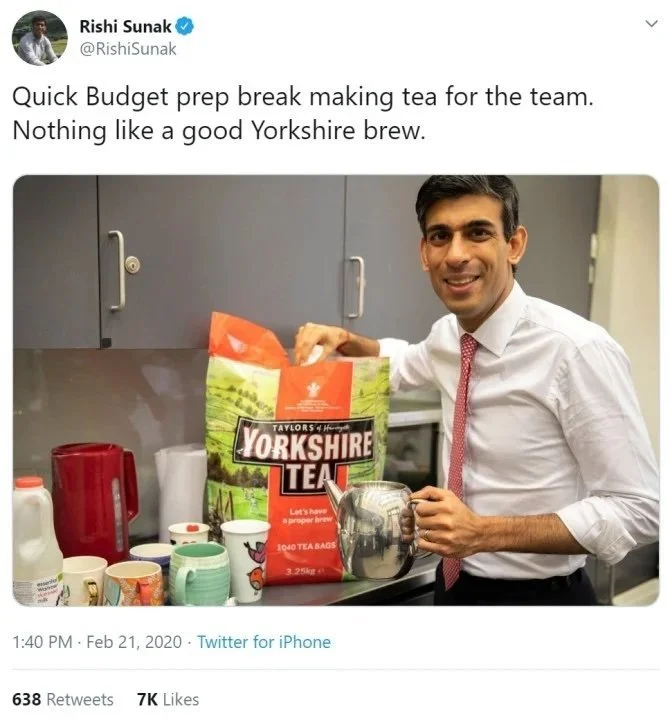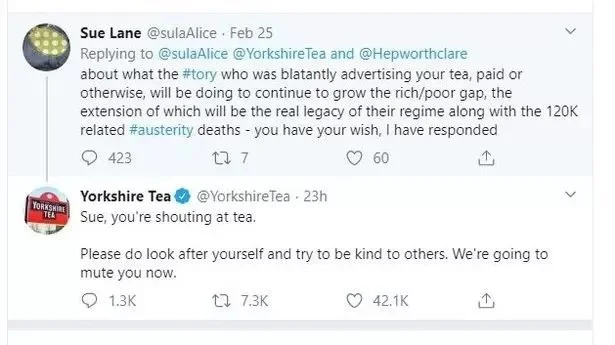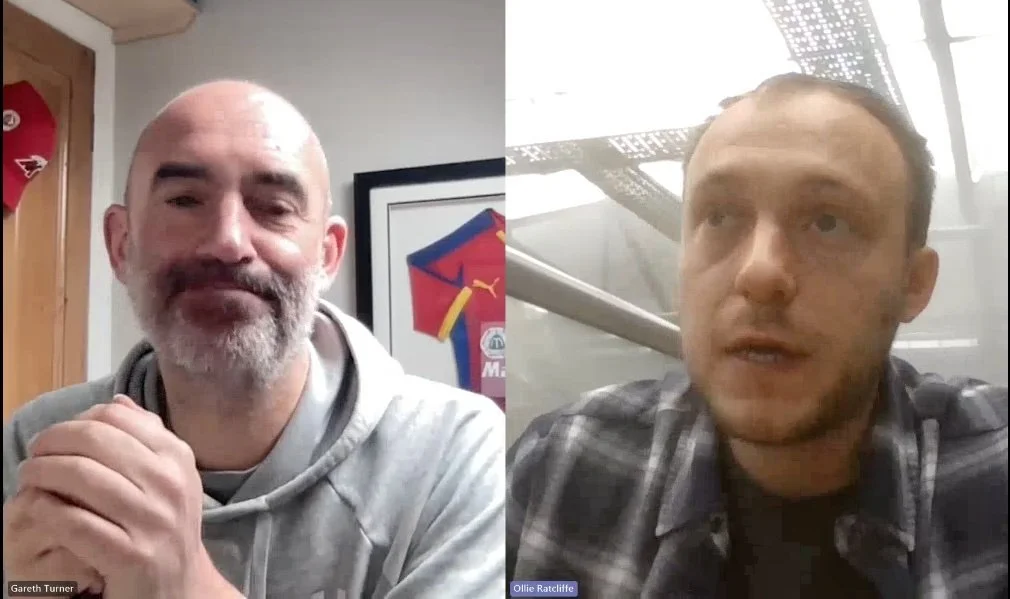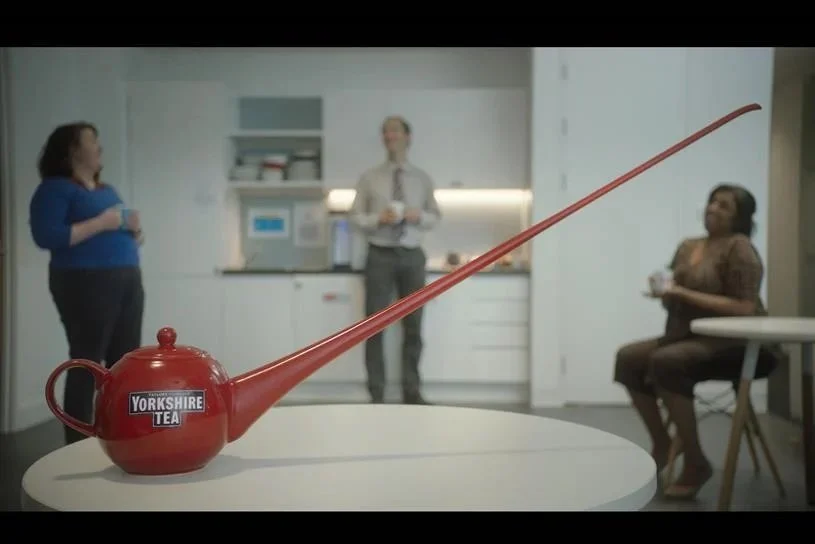SBR 27: WHAT CAN WE LEARN FROM YORKSHIRE TEA?
Welcome to SBR27.
Can we still say HNY? What's the rule? I'm going to make this the last time I say it this year. Finally, something we can all get behind.
I am on a mission to support other marketers this year. I think it's far too easy to chick stones at people from the LinkedIn sidelines. So I'm going to do my best to lift other marketers up. Nobody sets out to do bad work (I think!), none of us know the internal politics of a business or what the brief was.
Can we all commit to being kinder to each other this year? Especially when we're (relatively) faceless on social media.
Anyway, soap box mode off.....
This month we have the brilliant Ollie Ratcliffe chatting to us about his time at Yorkshire Tea, what big brands can learn from small brands, and the time he jacked it all in to run the socials for Cafe Mambo in Ibiza. Whilst Ollie was at Yorkshire Tea they had an incredible track record of striking gold over and over again with their social media.
OLLIE RATCLIFFE ON ZIG ZAG CAREERS, SOCIAL DISTANCING TEAPOTS AND SCRAPPY MARKETING
When I caught up with Ollie recently it looked as though the gates to hell had opened in the brewery. I am reliably informed that it was just a deep clean that was taking place.
I can also confirm that no marketers were harmed in the making of this newsletter.
Gareth: Hi Ollie - thanks for joining us. So, this chat is about what big brands can learn from small brands and vice versa. I’m sure a lot of our readers will know you for your work with Yorkshire Tea, but why don’t you give us a quick run-down of your career to date?
“It’s been quite a zig zaggy career if I’m honest. I actually never intended to go into marketing when I first started, when I left college I fell into working for the banks, selling mortgages, credit cards – all that fun stuff.”
Ollie: Thanks for having me! Sure, it’s been quite a zig zaggy career if I’m honest. I actually never intended to go into marketing when I first started, when I left college I fell into working for the banks, selling mortgages, credit cards – all that fun stuff. It wasn’t until I managed to land myself a job at Café Mambo in Ibiza as their social media manager when I really found my passion. After two successful years with them, amassing over half a million followers for their group, I came back to Leeds and started working on the agency circuit – most notably for iProspect Leeds, managing their owned & earned social media division working with clients like Chester Zoo, Hammerson shopping centers and Samsonite.
I’ve always stood by, the best thing about working in agencies, particularly a big one like the Dentsu network, is your surrounded really deep specialists in their respective fields – from media planners, strategists and channel specialists. As such, it really allows you to subconsciously broaden your skillset, which opened my eyes to the skills needed to take on my digital role at Yorkshire Tea.
As you say, most people probably know me from my work over the last 5 years at Yorkshire Tea and Taylors. We had some excellent campaigns during my time there; Social Distancing Teapot which we did with Lucky Generals that got shortlisted for a Cannes Lion and our activation in Australia to name two of my favourites, both of which contributed to me picking up Prolific North’s Marketer of the Year award in 2022.
Following from that, I’m now working with SME’s to help bring that big brand experience to smaller, growing brands on their way up.
Gareth: I still see Yorkshire tea as a challenger brand, but the reality is they're a big brand now, right? They're a big brand masquerading as a challenger brand. Tell me about coming from Yorkshire tea to working with SMEs which are much smaller in operation, what's the good stuff you can bring with you from big brands like Taylor's of Harrogate?
Ollie: There's a lot to be said for moving from big brands to a small, I think it gives you an understanding of what the end goal looks like and allows you to work back from there.
True measurement, brand tracking and consumer behavior, the sorts of things that in a small business you wouldn't necessarily know or you'd have knowledge gaps, so wouldn't be able to go out and pursue. Particularly, the brand funnel investment in your early years helps those conversations later down the line like; “what channels should we invest in?” “What's the return on activity for media spend?” – It’s that understanding from how the truly successful companies or marketing teams run things that will help you build the proper foundations.
Gareth: Things like brand tracking can be seen as expensive and “analysis paralysis” - there's this desire from smaller brands to be agile and keep moving forward. In my experience, coming from big businesses into smaller ones, you don't need to spend £100,000 to get something useful. Tell me how one might get data support or a brand funnel in an agile, cost-effective way?
Ollie: I think it comes back to my earlier point, in if you know what the end process looks like and how the big players do it, it allows you to experiment and build out your own, ‘scrappier’ processes using very similar methodology. So for example, one of the things I get asked about, because of my social media background is “what's the ROI on organic social?” so historically I’ve built my own audience surveying tool to prove it.
Gareth: Yeah, I've done some brand trackers at a fraction of the cost of big suppliers (£10k or less) by using the experience gained from the brand trackers I have used over the years and then deploying that knowledge in a scrappier way. You're not going to get all the nuance and all the 1000s of responses, but you're going to get enough to help you make good decisions.
Ollie: One of the joys of working for a big business is you have visibility of the plethora of options and data points that are available, so when you take this to a small business, you can easily sniff out that one little data-nugget that you need, without the expense of the full data-set.
Gareth: What about something that you'd encourage people to forget when moving from a big brand to a small brand. What baggage should we leave at the door?
Ollie: Sometimes when you're in a bigger business and strategy is handed to you on a plate, it's so easy to get stuck in the motions and go along with it as opposed to developing new skills and trying new technologies, especially when there’s a highly talented agency team supporting you. I think I’d say encourage yourself to bring your own creativity to the table, try new things, experiment – it might be what originally got you into a marketing career in the first place.
Gareth: I like that. There's a resourcefulness and an attitude that is encouraged in small businesses that if I don't know how to do it, I'm gonna find out. I'll Google it. I'll do it myself.
Ollie: Exactly! I think it’s important, to be honest, that’s one thing we did really well at Yorkshire Tea, we were constantly encouraged to try new things and be creative, both in how we looked at our media buying but also the creative that was deployed.
Garetj: So, you've talked about going from big brands like Yorkshire Tea, into smaller businesses but what if you'd gone the other way. What's the good stuff you can take with you from smaller brands that large brands would benefit from?
Ollie: It comes back to that scrappiness. When you’re small, you've got to expand your skill set because there's less people, less specialists and you've got to dip into lots of things. It also means you come from a place where every penny counts. You know how to prove the ROI because you've had to do it to get marketing budget signed off in the first place. So, taking that commerciality and applying it to a big business will only ever put you in good stead. Especially, when you're working with your £100 million businesses, there's an element you lose that connection to the bottom line as it’s that upper funnel awareness where the investment needs to go. It's an understanding how that translates down and chasing what that bottom line number or additional contribution looks like.
Gareth: Some great tips. I love that idea of commerciality and being cost focused. There's a complacency perhaps in large businesses where £5,000 or £10,000 will get lost in the rounding but that's a big chunk of marketing spend for some businesses.
Ollie: That's one of the things that attracted me to go from a big business to working with smaller ones, that idea of making every penny count towards something. When you're in a big business, someone will come to you with a five figure invoice and you almost come a bit numb to it because you're used to working with budgets of several million pounds. Then coming to a small business where your total marketing spend for the year is a fraction of that, but with the pressure of it needing to wash its own face and bring back a positive ROI – it causes you to be really critical in your thinking.
Gareth: How do you do that then? If you give people top tips for budgeting?
Ollie: It comes back to what we were speaking about at the start. I think investing in a strong measurement/forecasting framework early on, be it a brand funnel or some form of brand tracking upfront will then give you a good basis to make those budget decisions because, otherwise you're shooting in the dark. If you've got a funnel in place those conversations get a lot easier, because in most cases, you can match the investment to your goals, be it awareness, commercial or something else.
Gareth: There's the benefit of getting that baseline in before you do anything. In a traditional funnel, we're going from awareness to consideration to purchase. You can see what your decay rates are on each of those. For most small brands, it’s making more people aware of your product and converting them down into a purchase through physical availability. It just allows you to make simple decisions. When you're in agile business, you've got to make decisions like that.
But having that as a benchmark before you do anything is important. You can test your activity, measure it and then scale it if it works.
Last question - what are your top tips to other marketers?
Ollie: Experiment, and surround yourself with good people. When I first started out I didn’t really have loads of expertise in marketing, but I had a really good boss and mentor. I gave it a go and that opened a new world and throughout the rest of my career it's always been like that.
I remember there was a proposal I once put forward for a technology I'd never really used before, it was brand new onto the scene. And I was like, I just want to do this and I've got an idea, I'm just going to do it. That ability to be able to just give things a go and not be afraid of failure is important.
Also in my earlier days, my expertise was naturally quite social media heavy, but now, I'm doing more offline stuff than online. The reason I've been able to make those shifts is because I've been surrounded by specialists to soak information off. As a social media manager at a big agency, I was surrounded by PPC, SEO, digital experts that broadened my horizons to all the other different digital channels. Then taking that to Taylors where I was exposed to ATL, NPD and offline campaigns, it expanded my skillset even further.
So, just make sure you surround yourself with really knowledgeable people that you can pick little soundbites off every now and then.
Gareth: There's no shame in that. I think it's fine to not have all the answers and to surround yourself with great people. I've built a good career on selecting great people to have around me. It's something I'm proud of.
So wrapping up, if people have seen this and want to chat to you more, how can people get in touch with you?
Ollie: Always happy to have a chinwag about marketing




